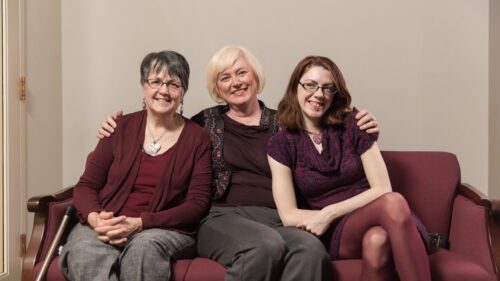In many respects, broader acceptance of LGBTQ people in our society has advanced at light speed over the past few years. But when it comes to communities of faith, the path to making LGBTQ people feel welcome remains uncharted territory.
As a family therapist serving LGBTQ young people in Alabama, I have heard countless stories of both negative and positive responses to the disclosure of queer and trans identities. It strikes me that stories of parental rejection so frequently mention faith: “My parents are religious, so it wasn’t okay when I came out.” What saddens me about this type of story is the automatic assumption that religiosity requires rejection!
Rarely, unfortunately, does the other type of response—acceptance—involve a story about the church. I’ve never heard a teenager say, “My parents have a strong faith, so I didn’t have to worry about coming out to them.”
I remain optimistic that one day LGBTQ acceptance won’t have to hide in the shadows of our church.
The one exception to this I can remember was a very accepting parent who once told me that her pastor told her, “I can’t preach this from the pulpit, but I personally think you should love your gay son.” I was heartened to hear that this parent received an affirmation from her pastor, but dismayed that the message couldn’t be more widely shared. Still, I remain optimistic that one day LGBTQ acceptance won’t have to hide in the shadows of our church. And I have some ideas about how I think we will get there.
First, some background.
In his 2002 article “Queer in America,” developmental scientist Stephen T. Russell argued that LGBTQ youth in the United States were hindered in their development as citizens because they faced systemic barriers to full participation in the institutions of family life, education and faith.
In the two decades since, quite a bit has changed. In 2015 the Supreme Court upheld the rights of same-sex couples to marry, providing protections for queer families that President Biden signed into law in 2022. Entering deeper into family life, nearly 15 percent of same-sex couples are now raising children.
Within the education system, nearly half of U.S. states and territories have passed laws prohibiting bullying on the basis of sexual or gender identity, taking a step toward inclusion in schools.
Faith, it would seem, is the next frontier. How do we make our parishes welcoming to LGBTQ individuals and their families?
How do we make our parishes welcoming to LGBTQ individuals and their families?
Based on the hundreds of conversations I’ve had with LGBTQ youth, I have some ideas about how the church can be more welcoming and perhaps even help close the gap between acceptance in the secular world and the realities in Catholic spaces.
Family support matters, and parents take their cues from the church
Family support is a key driver of well-being for LGBTQ individuals across their lifespan. The evidence is quite clear on this matter. Family rejection is associated with depression, anxiety, suicide, illicit substance use and risky sexual behavior, while family acceptance is associated with optimism, happiness and self-acceptance. For parents who want healthy kids, the choice is simple: love and support them.
Yet when a child comes out as queer or gender-diverse, many Christian parents have a knee-jerk reaction of fear. This reaction has been conditioned by a moral theology that denigrates the lives of queer and trans individuals. What this means, though, is that many parents take their cues from the church. If the church can promote fear, it can also promote love.
Church leaders have a wonderful opportunity to help LGBTQ individuals by encouraging parents to love and support their LGBTQ children. Research has shown that when religious leaders encourage parents to support LGBTQ persons, family relationships improve. Such encouragement can be made both during pastoral care and in homilies.
Many LGBTQ individuals embrace faith
One in five LGBTQ people say that religion or spirituality is important to them, totaling well over 3 million queer and trans youth and adults in the U.S. alone who value religion and spirituality. This is a sizable mission field if we are up for the task of bolstering LGBTQ inclusion in the church.
While much has been made of the distinction between spiritual and religious, and LGBTQ individuals are among those who might prefer the term spiritual, I would argue that the difference between the two ideas is not as great as we imagine. The philosopher John Dewey defined religious as that which provides “deep and enduring support for the processes of living.”
Research has shown that when religious leaders encourage parents to support LGBTQ persons, family relationships improve.
Doesn’t that describe what is both spiritual and religious? It certainly describes what we are offering in the church. Our task as Catholics is to unite the two by inviting LGBTQ persons to experience spirituality through our religious practices, that is, the sacraments.
Parish LGBTQ ministries pave the way for LGBTQ young people in the church
I am a new Catholic. I entered the church during the Easter Vigil in 2023, after 18 years away from my Protestant roots. When I began to learn what becoming Catholic would look like, nervous about whether I could bring my full self into a faith community, I visited the website of a parish in a neighboring metropolitan area.
I remember breathing a sigh of relief when I saw an LGBTQ Bible study advertised on their homepage. I was greatly encouraged that a religious community would support the visibility of LGBTQ members. At the parish level, the presence of LGBTQ ministries, and the decision to advertise them proudly, not only helps those they serve, but also signals to queer Catholic youth that they have a home in the church. It shows non-Catholics that they belong here, too.




